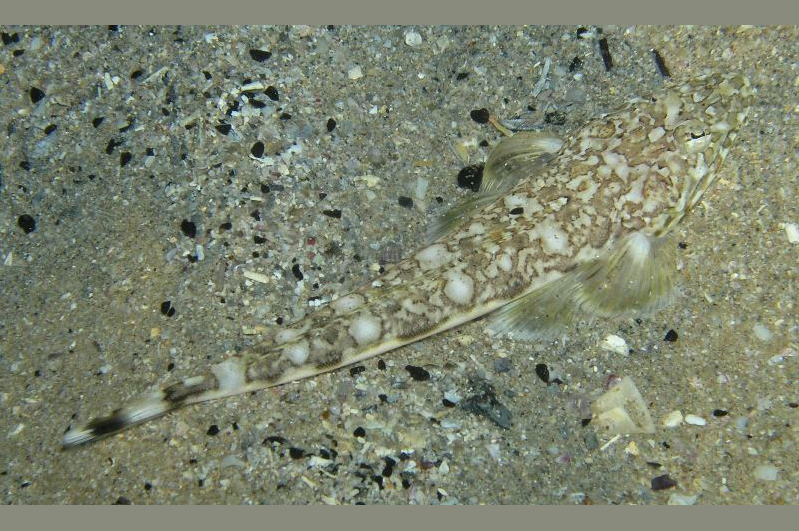Marbled Flathead, Platycephalus marmoratus Stead 1908

A Marbled Flathead, Platycephalus marmoratus, in Nelson Bay, New South Wales, June 2008. Source: Tom Davis / iNaturalist.org. License: CC By Attribution-NonCommercial
Marbled Flathead, Platycephalus marmoratus Stead 1908
More Info
|
Distribution |
Endemic to temperate inshore and continental shelf waters of Australia from off Caloundra (Queensland) to Flinders Island (Tasmania). Inhabits soft sediment areas usually at depths of 20-80 m, preferring offshore waters. Juveniles frequently enter shallow bays and estuaries. |
|
Features |
Dorsal fin I, VII or VIII, 13; Anal fin 13; Caudal fin 11-13; Pectoral fin 19-22; Pelvic fin I, 5; Lateral line scales (pored) 63-70. Body elongate, slightly depressed. Head large (length 28-30% SL), strongly depressed, with several prominent, smooth ridges; a single preocular spine present; eyes small (14-15% HL), iris lappet broad, simple; mouth large, extending to level of anterior third of eye; teeth of upper jaw small, villiform, more enlarged and canine-like near symphysis only, a single patch of canines and smaller teeth on vomer, two series (one series of large teeth with a secondary series of minute teeth outside) of teeth on palantines, no greatly enlarged canines; two strong preopercular spines at angle of preopercle, lower slightly longer than upper, accessory spine ventrally present rarely; 2 gill rakers on lower limb, 7-11 on upper limb of first gill arch rudimentary; interopecular flap absent. Scales small, finely ctenoid (some cycloid on ventral surface), covering body, most of head behind eyes and operculum, interorbit and snout naked; lateral line scales not differentiated from adjacent scales on side, 107-119 oblique rows of scales above lateral line, no scales with spines or ridges, single pored. First dorsal fin spinous with short base, first spine very short but distinct, third spines the longest. Second dorsal fin with moderately long base, second ray longest, others decreasing in length posteriorly. Anal fin similar in shape, but with shorter rays which increase in length slightly posteriorly; opposite and slightly longer-based than second dorsal fin. Caudal fin truncate or slightly rounded. Pectoral fins broad and rounded. Pelvic fins large, based below centre of pectoral fins. |
|
Size |
Maximum length at least 61 cm TL. |
|
Colour |
Reddish brown to yellowish brown dorsally, with 5 broad, darker cross bands (1st at origin of dorsal, last at its termination) and a mottled pattern of pale and dark spots and blotches; whitish ventrally. Caudal fin mostly dark brown (darkest submarginally), paler basally, with a broad white posterior margin, without horizontal bars; dorsal fins translucent, brown spots on spines and rays; pectoral fins greyish with pale margins; pelvic fins darker brown with striking white margins; anal fin whitish. |
|
Feeding |
Ambush predator, presumably feeds mostly on fishes, and also large benthic crustaceans. |
|
Conservation |
Not evaluated. |
|
Remarks |
Until the description of Platycephalus orbitalis, P. marmoratus was thought to also occur in Western Australia. |
|
Etymology |
The species is named marmoratus in reference to the marbled body pattern. |
|
Species Citation |
Platycephalus marmoratus Stead, 1908, New Fishes N.S.W.: 9, pls 3-5, off Port Stephens, New South Wales. |
|
Author |
CSIRO Marine & Atmospheric Research & Bray, D.J. 2020 |
|
Resources |
Marbled Flathead, Platycephalus marmoratus Stead 1908
References
Coleman, N. 1980. Australian Sea Fishes South of 30ºS. Lane Cove, NSW : Doubleday Australia Pty Ltd 309 pp.
Grant, E.M. 2002. Guide to Fishes. Redcliffe : EM Grant Pty Ltd 880 pp.
Imamura, H. 1996. Phylogeny of the family Platycephalidae and related taxa (Pisces: Scorpaeniformes). Species Diversity 1(2): 123-233
Imamura, H. 2006. Rediagnosis of the marbled flathead, Platycephalus marmoratus (Actinopterygii: Teleostei: Platycephalidae), with comments on the composition of the type series. Species Diversity 11: 295-306.
Imamura, H. 2015. Taxonomic revision of the flathead fish genus PlatycephalusBloch, 1785 (Teleostei: Platycephalidae) from Australia, with description of a new species. Zootaxa 3904(2): 151-207. https://doi.org/10.11646/zootaxa.3904.2.1
Imamura, H. & Knapp, L.W. 2009. Platycephalus orbitalis, a new species of flathead (Teleostei: Platycephalidae) collected from western Australia. Zootaxa 2271: 57-63
Kuiter, R.H. 1993. Coastal Fishes of South-eastern Australia. Bathurst : Crawford House Press 437 pp.
Kuiter, R. & Kuiter, S. 2018. Coastal sea-fishes of south-eastern Australia. Seaford, Victoria : Aquatic Photographics, 371 pp.
McCulloch, A.R. 1916. Report on some fishes obtained by the F. I. S. "Endeavour" on the coasts of Queensland, New South Wales, Victoria, Tasmania, South and South-Western Australia. Part IV. Biol. Results "Endeavour" 4(4): 169-199.
Stead, D.G. 1908. New fishes from New South Wales (No. 1). Department of Fisheries, New South Wales, Sydney. New Fishes N.S.W. 12 pp.






